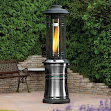Watt the BTU . . . ?
When deciding whether to buy or hire a portable air
conditioning unit, you may come across the term ‘BTU’ or alternatively
Kilowatts. BTU stands for British Thermal Unit and in
the world of HVAC is the amount of heat
that an air conditioner can remove from a room.
If an air conditioner’s capacity is measure in Kilowatts then one
Kilowatt is equivalent to 3,412 BTUs.
For the science-minded among us, One BTU is the amount of energy needed
to raise 1 pound of water 1°F
at sea level.
Why are BTUs or Kilowatts important when choosing an air
conditioner? Having the correct number
of BTUs for the space you need to cool means that the room will be cooled
efficiently. It should also be borne in
mind that as the BTU rating increases so does the weight, size and cost of the
air conditioner.
Too high a BTU means that although the room will cool
quickly, the unit will cycle on and off once
the temperature is reached and to keep
it at that temperature, overworking the
compressor and shortening the life of the unit.
If the air conditioner is too small in BTU terms for the size of the
space to be cooled, then the desired temperature will not be reached, the unit
will continuously work too hard, possibly shortening its lifespan.
It may seem a daunting task to have to calculate the number
of BTUs needed, but London Cool’s website has an easy to use cooling
calculator. All you need to do is enter
the room sizes, or total area and London Cool will do the rest. The calculator will list the types of air
conditioning unit most suitable for the space, the number required and the
total cooling capacity in Kilowatts.
Our Sales Team are on hand to help and advise, especially as
there are other factors that may affect the number and choice of portable air
conditioners. It is important to know
whether there is an area to vent the warm air away, eg an opening window or a
ceiling void, what the room will be used
for (eg kitchens or server rooms/data centres will need more cooling), how many
people occupy the room and the level of activity, whether the room gets a lot
of direct sunlight and the outside
temperature.

Comments
Post a Comment
We would love to hear your comments or views on portable air conditioners or fixed air conditioning systems or anything else in our Cool Blog